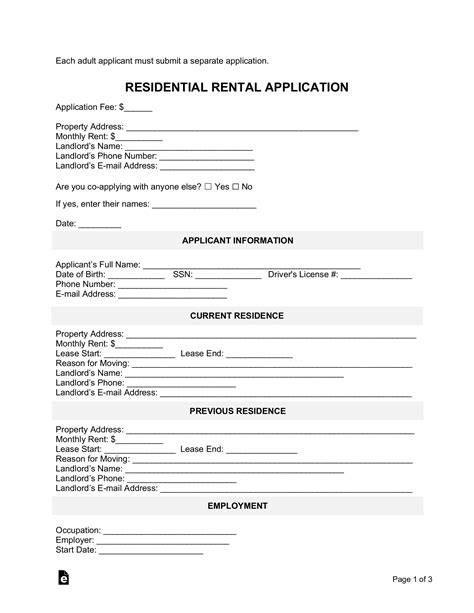The process of renting a new place can be both exciting and nerve-wracking, with a multitude of forms to fill out and personal information to provide. One piece of information that is often requested on rental applications is your Social Security number (SSN). But is it really necessary to provide this sensitive information, and what are the potential risks of doing so?
In this article, we will explore the importance of providing your SSN on a rental application, the potential risks involved, and what you can do to protect your personal information.
Why Do Landlords Need Your SSN?
Landlords and property managers typically request your SSN on a rental application for a few key reasons:
- Credit check: A SSN is required to run a credit check on you, which helps landlords assess your creditworthiness and determine whether you are a reliable tenant.
- Identity verification: Your SSN can be used to verify your identity and ensure that you are who you claim to be.
- Background check: In some cases, landlords may use your SSN to conduct a background check on you, which can reveal any past convictions or other red flags.
The Risks of Providing Your SSN
While providing your SSN on a rental application may seem like a necessary evil, there are some potential risks to consider:
- Identity theft: If your rental application falls into the wrong hands, your SSN could be used to commit identity theft. This could lead to a range of problems, from fraudulent credit card activity to tax-related issues.
- Data breaches: Even if the landlord or property manager is reputable, there is always a risk of a data breach. If the company's systems are hacked, your SSN could be compromised.
- Unnecessary use: If you are not approved for the rental, your SSN may still be stored by the landlord or property manager. This could lead to unnecessary use of your SSN, such as it being shared with third-party vendors.
Alternatives to Providing Your SSN
If you are concerned about providing your SSN on a rental application, there are a few alternatives you could consider:
- Provide alternative identification: You could offer to provide alternative forms of identification, such as a driver's license or passport.
- Use a credit report service: Some credit report services, such as RentTrack, allow you to share your credit report with landlords without revealing your SSN.
- Look for SSN-free applications: Some landlords and property managers may offer SSN-free rental applications. These applications may use alternative methods to verify your identity and creditworthiness.
Tips for Protecting Your SSN
If you do need to provide your SSN on a rental application, there are a few steps you can take to protect your personal information:
- Use a secure online application: Make sure the online application is secure and uses encryption to protect your data.
- Keep a copy of your application: Keep a copy of your rental application, including your SSN, in a safe and secure location.
- Monitor your credit report: Keep an eye on your credit report and watch for any suspicious activity.

Conclusion
While providing your SSN on a rental application may seem like a necessary part of the rental process, it's essential to be aware of the potential risks involved. By understanding the reasons why landlords need your SSN, the risks of providing it, and the alternatives available, you can make an informed decision about how to protect your personal information. Remember to always prioritize your safety and security, and don't hesitate to ask questions or seek alternative solutions if you are unsure about providing your SSN.






FAQs
Why do landlords need my SSN?
+Landlords need your SSN to run a credit check, verify your identity, and conduct a background check.
What are the risks of providing my SSN?
+The risks of providing your SSN include identity theft, data breaches, and unnecessary use of your SSN.
Can I provide alternative identification?
+Yes, you can offer to provide alternative forms of identification, such as a driver's license or passport.
